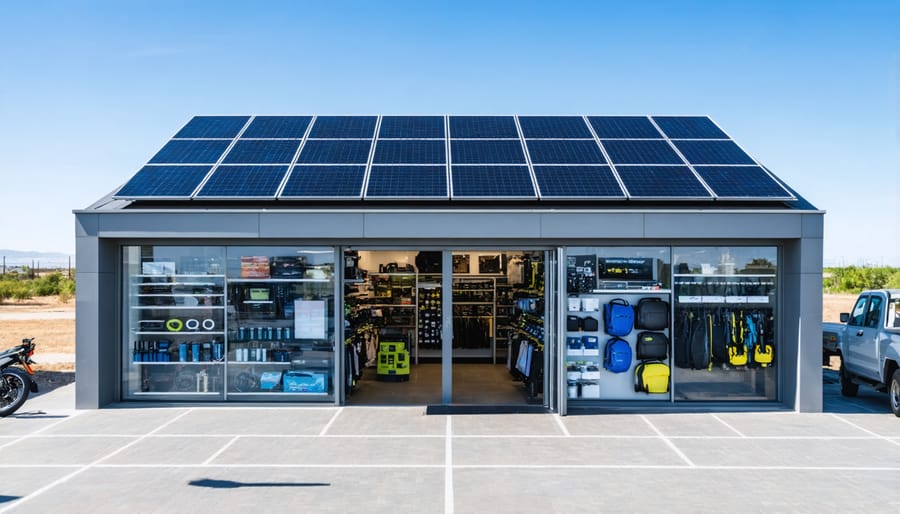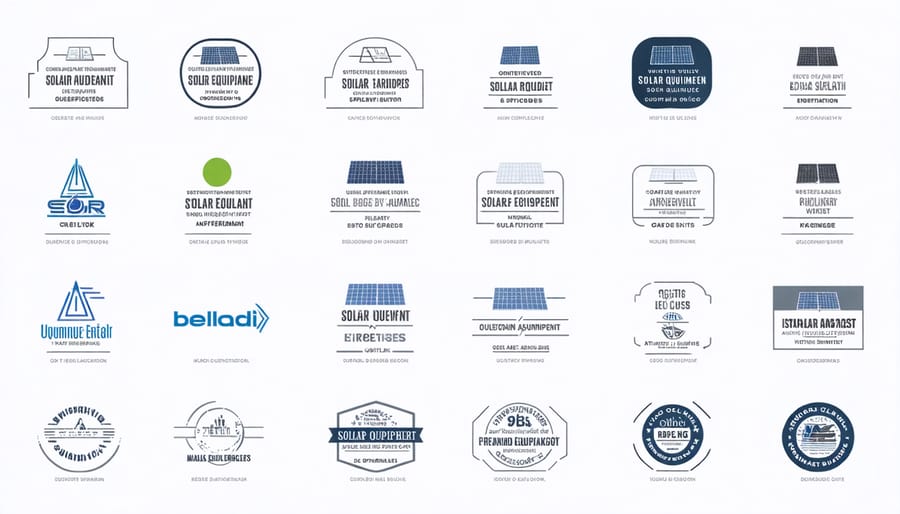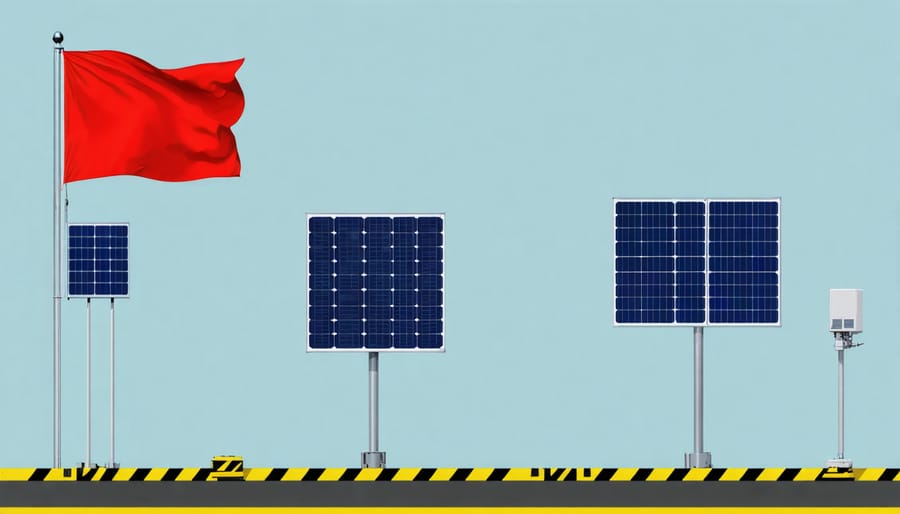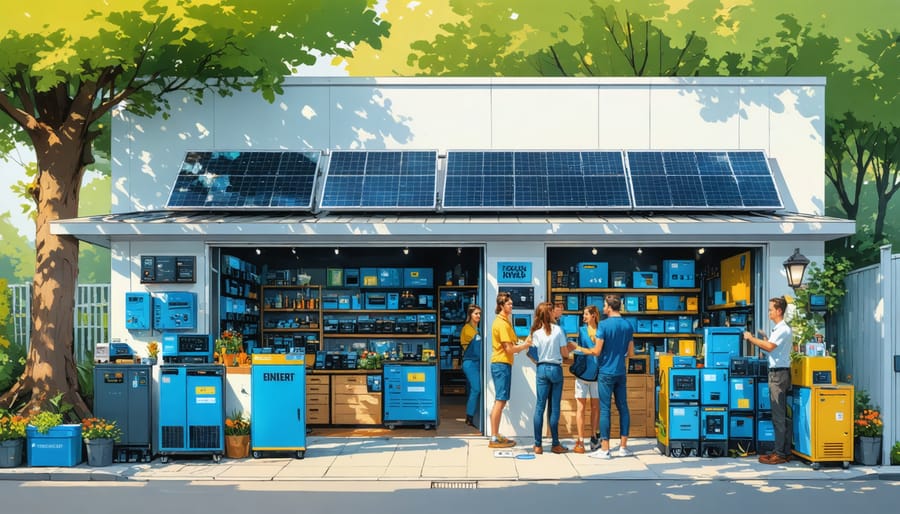Find Quality Solar Equipment Near You (Without Getting Ripped Off)
Navigate your local solar equipment market confidently by starting with trusted online directories like EnergySage and SolarReviews – they list verified suppliers and installers within your zip code. Research local distributors through your state’s solar energy association, connecting you directly with certified equipment providers who understand regional requirements and incentives. Visit nearby home improvement centers with dedicated solar departments, where you can inspect panels, inverters, and mounting systems firsthand while avoiding common solar equipment pitfalls. Contact solar installation companies in your area – many maintain warehouses with quality equipment and offer expert guidance on selecting components that match your specific needs and local climate conditions.
This direct approach to sourcing solar equipment locally ensures you’ll find reliable suppliers while building valuable relationships with industry experts who can support your renewable energy journey. Focus on providers offering warranties, certification documentation, and post-purchase support to maximize your investment’s long-term value.
Local Solar Equipment Options You Should Know About
Solar Specialty Stores
Solar specialty stores are your one-stop destinations for comprehensive solar equipment solutions. These dedicated retailers focus exclusively on solar products, offering everything from panels and inverters to mounting hardware and batteries. The staff at these stores typically have extensive knowledge about solar technology and can provide expert guidance on choosing the right equipment for your needs.
Many solar specialty stores offer free consultations and can help you understand local regulations, available incentives, and installation requirements. They often maintain showrooms where you can see different solar products in person and compare various brands side by side. Some stores even provide installation services or can recommend trusted local installers.
Look for stores that carry multiple brands and offer warranties on their products. Many also provide after-sales support and maintenance services, making them valuable long-term partners in your solar journey.

Home Improvement Centers
Major home improvement retailers like Home Depot, Lowe’s, and Menards now stock a variety of solar equipment in their stores. You’ll find essential components like solar panels, inverters, mounting hardware, and batteries. These stores often offer the convenience of same-day pickup and competitive pricing, making them ideal for DIY solar projects or emergency replacements.
Most home improvement centers have knowledgeable staff in their electrical departments who can guide you through product selection. They typically stock trusted brands and offer warranties on their solar equipment. Many locations also provide installation services through certified contractors if you prefer professional help.
Remember to check their websites before visiting, as inventory varies by location. Some stores even offer rental options for specialized solar installation tools, helping you save on one-time-use equipment.
Online Retailers with Local Warehouses
Many online solar retailers now maintain local warehouses, offering the best of both worlds – competitive online prices with quick local pickup. Popular platforms like Solar Direct and Alternative Energy Store often partner with regional distribution centers, letting you browse their extensive catalogs online and collect your items nearby. Some even offer same-day pickup for emergency replacements or time-sensitive projects. These hybrid sellers typically provide detailed product specifications and reviews on their websites, while their local presence means you can inspect items before purchase and get face-to-face support when needed. Check their warehouse locator tools to find distribution points in your area, and always confirm stock availability before making the trip.
Smart Ways to Research Local Solar Suppliers
Online Search Strategies
Start your online search with targeted keywords like “solar panels,” “solar equipment suppliers,” or “solar installers” followed by your city or ZIP code. Google Maps is particularly helpful, as it shows you nearby suppliers with customer reviews, operating hours, and contact information. Take advantage of specialized solar directories like EnergySage or SolarReviews, which let you compare local vendors and their offerings.
Don’t forget to check online marketplaces like Facebook Marketplace or Craigslist for potential deals on solar equipment, but always verify the seller’s credentials and product authenticity. Set up Google Alerts for solar equipment sales in your area to stay informed about new listings and special offers.
When browsing search results, look beyond the first page. Sometimes smaller, reliable suppliers might be listed further back. Use the “near me” filter in search engines, and consider expanding your search radius if local options are limited. Remember to check customer reviews and ratings across multiple platforms to get a comprehensive view of each supplier’s reputation.
Pro tip: Save promising suppliers to a custom Google Maps list for easy reference during your research phase.
Local Solar Communities and Forums
Connecting with local solar enthusiasts can be a goldmine of firsthand experiences and recommendations. Start by joining Facebook groups dedicated to solar energy in your area – these communities often share supplier recommendations and installation tips. Websites like Meetup.com frequently host solar energy meetups where you can network with experienced solar users and installers.
Local environmental organizations and sustainability groups are excellent resources for finding trustworthy equipment suppliers. Many conduct regular workshops and maintain active online forums where members discuss their solar journeys. Check if your city has a renewable energy association or cooperative – these organizations often maintain lists of verified suppliers and offer member discounts.
NextDoor and community bulletin boards can also connect you with neighbors who’ve already gone solar. Their experiences with local suppliers and equipment choices can provide valuable insights. Don’t forget to check community college sustainability programs, as they often partner with local suppliers and maintain active solar enthusiast networks.
Industry Certifications to Look For
When searching for solar equipment suppliers, look for certifications that demonstrate quality and reliability. The UL (Underwriters Laboratories) certification is crucial, particularly UL 1703 for photovoltaic modules. The IEC 61215 and IEC 61730 certifications ensure international quality standards for solar panels. Many leading solar manufacturers also carry ISO 9001 certification for quality management systems.
For inverters, seek out products with ETL certification and IEEE 1547 compliance. Local suppliers should be NABCEP (North American Board of Certified Energy Practitioners) certified, which demonstrates expertise in solar equipment installation and sales. Additionally, look for membership in organizations like SEIA (Solar Energy Industries Association) and state-specific solar trade associations, as these indicate commitment to industry best practices and ongoing professional development.

Questions to Ask Before Buying
Warranty and Support
When investing in solar equipment, understanding warranty coverage and local support options is crucial for long-term peace of mind. Most reputable local suppliers offer comprehensive warranties that typically cover manufacturing defects, performance guarantees, and installation workmanship. These warranties can range from 10 to 25 years, depending on the component and manufacturer.
Before making a purchase, ask potential suppliers about their warranty terms and solar panel longevity. Look for suppliers who provide clear documentation of their warranty policies and maintain local service centers for quick response times. Many local installers also offer ongoing maintenance packages and emergency support services.
Key warranty considerations should include:
– Equipment performance guarantees
– Labor coverage for repairs and replacements
– Response time commitments
– Transfer options if you sell your property
– Exclusions and limitations
For the best support experience, choose suppliers with established local presence and positive customer reviews regarding their after-sales service. Consider joining local solar communities or forums where you can share experiences and get recommendations for reliable service providers. Remember to keep all warranty documentation safely stored and maintain regular communication with your supplier for optimal system performance.
Installation and Compatibility
When it comes to installing solar equipment, compatibility and professional installation are crucial for optimal performance. Most reputable solar suppliers offer installation services or can recommend certified installers in your area. These professionals will assess your property’s structural integrity, roof orientation, and shading conditions to ensure your solar system works efficiently.
Before purchasing equipment, ask potential suppliers about their installation packages. Many provide end-to-end services, including permits, installation, and system monitoring setup. They’ll also verify that your chosen components are compatible with your existing electrical system and local utility requirements.
Look for installers who are NABCEP (North American Board of Certified Energy Practitioners) certified – this is the gold standard in solar installation credentials. A qualified installer will conduct a thorough site assessment and provide a detailed installation timeline and warranty information.
Remember to inquire about:
– Installation warranty coverage
– Post-installation support and maintenance
– System monitoring capabilities
– Emergency service availability
– Grid connection requirements
– Local building codes compliance
Most suppliers can complete residential installations within 1-3 days, though larger systems may take longer. They should also help you understand your system’s compatibility with future upgrades or additions, ensuring your solar investment remains valuable for years to come.

Red Flags to Watch For
When searching for solar equipment suppliers in your area, being aware of potential red flags can save you from costly mistakes and unreliable products. Watch out for dealers who offer prices that seem too good to be true – while everyone loves a bargain, unusually low prices often indicate poor quality equipment or counterfeit products.
Be cautious of suppliers who pressure you into making immediate decisions or refuse to provide detailed product specifications. Legitimate solar equipment dealers understand that this is a significant investment and will give you time to make an informed choice.
Check the warranty terms carefully. If a supplier offers warranties that are significantly shorter than industry standards (typically 25 years for solar panels and 10 years for inverters) or uses vague language about coverage, consider this a warning sign.
Pay attention to their business history and physical presence. Be wary of companies that lack a proper business address or have only been operating for a few months. Established suppliers usually maintain showrooms or warehouses where you can inspect equipment in person.
Look out for dealers who aren’t willing to provide references from previous customers or show proof of proper licensing and certification. Legitimate suppliers should be happy to share customer testimonials and documentation of their credentials.
Be skeptical of companies that don’t offer after-sales support or maintenance services. Quality suppliers understand the importance of long-term customer relationships and will provide ongoing support for their products.
Another red flag is when suppliers can’t clearly explain their products’ specifications or dodge questions about equipment origin and certification. Reputable dealers should be knowledgeable about their products and transparent about their sourcing.
Trust your instincts – if a supplier’s communication seems unprofessional or if they’re unwilling to put agreements in writing, it’s better to look elsewhere. Remember that protecting your investment starts with choosing a trustworthy supplier.
Making Your Final Decision
After researching your options and gathering quotes, it’s time to make your final decision on solar equipment. Start by creating a comparison spreadsheet to evaluate total costs, warranty terms, and installation timelines from different suppliers. Consider both immediate expenses and long-term value when comparing prices.
Look beyond the price tag and assess the supplier’s reputation, customer service quality, and after-sales support. Read recent customer reviews and ask for references from installations completed in the past year. A slightly higher upfront cost from a reliable supplier often proves more economical than choosing the cheapest option with limited support.
Request detailed proposals that outline equipment specifications, installation procedures, and maintenance requirements. Pay special attention to warranty coverage and performance guarantees. Make sure all promises are documented in writing and verify that the supplier is properly licensed and insured.
Consider the supplier’s proximity to your location, as this can affect response times for maintenance and repairs. Local suppliers often provide better ongoing support and can respond more quickly to urgent issues.
Before signing any contracts, have a qualified legal professional review the terms and conditions. Understand the payment schedule, cancellation policies, and any additional fees that might apply. Don’t hesitate to negotiate terms or ask for clarification on any points that seem unclear.
Trust your instincts – if a supplier seems hesitant to provide information or pushes for an immediate decision, take a step back. The right supplier will be transparent, patient, and willing to address all your concerns professionally.
Finding the right solar equipment in your local area doesn’t have to be a daunting task. By following the steps and strategies we’ve discussed, you can confidently navigate the market and make informed decisions about your solar investment. Remember to start with thorough online research, leveraging search engines, review sites, and solar marketplace platforms to identify potential suppliers near you.
Don’t hesitate to reach out to multiple vendors and request detailed quotes. Taking the time to compare prices, warranties, and service packages will help you secure the best value for your investment. Local solar equipment suppliers often provide advantages that online retailers can’t match, including personalized service, faster delivery, and reliable after-sales support.
Your solar journey is an important step toward energy independence and environmental sustainability. Whether you’re a homeowner looking to reduce electricity bills or a business owner aiming to decrease operational costs, local solar equipment providers can help you achieve your goals.
Take action today by contacting nearby suppliers, requesting consultations, and comparing your options. Remember that many local vendors offer free site assessments and can provide valuable insights about the best solar solutions for your specific needs. The path to clean, renewable energy starts right in your community, and the perfect solar equipment supplier might be just around the corner.











